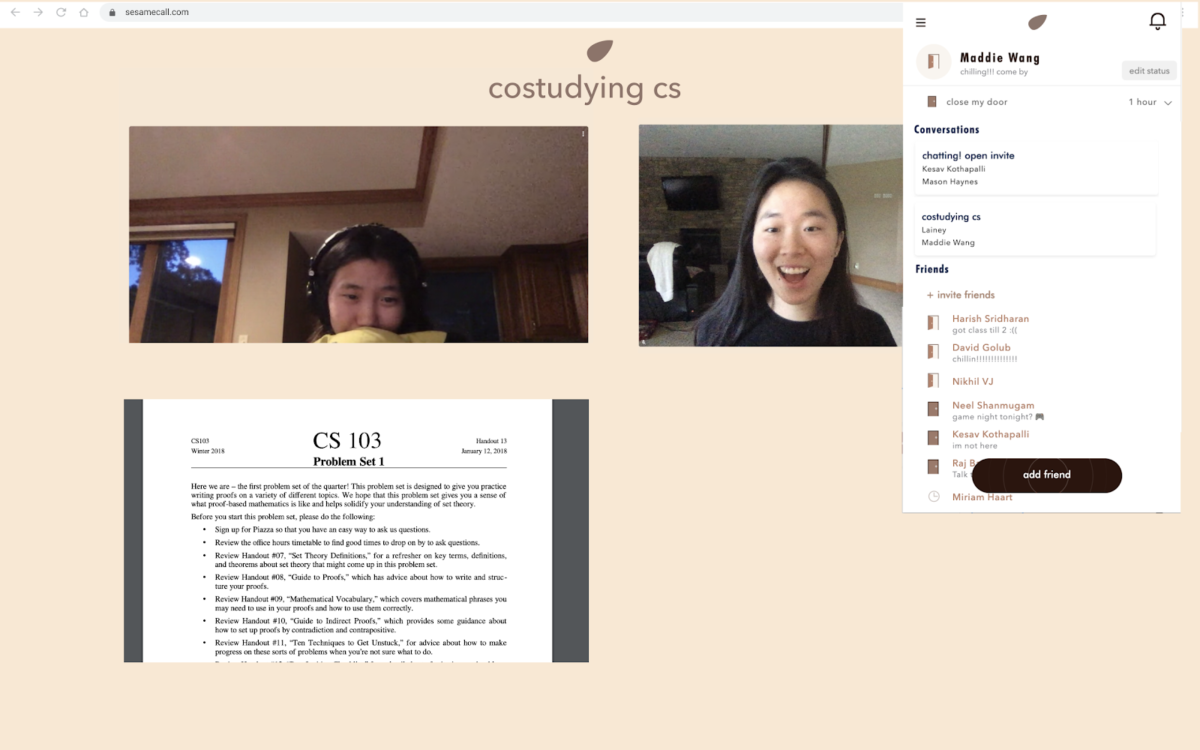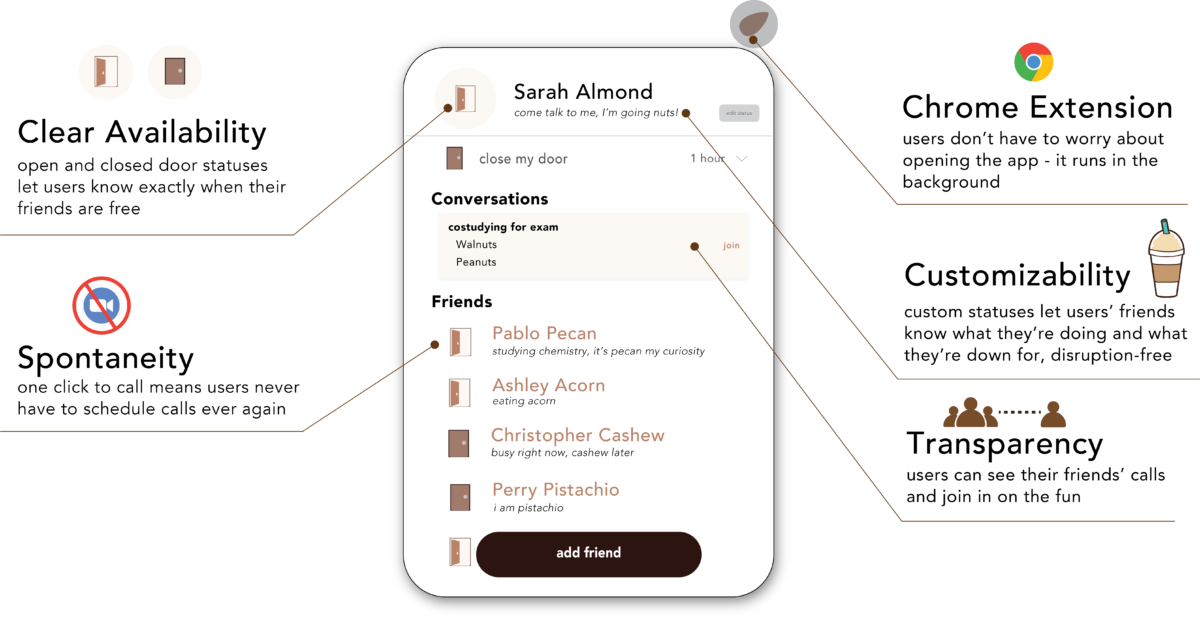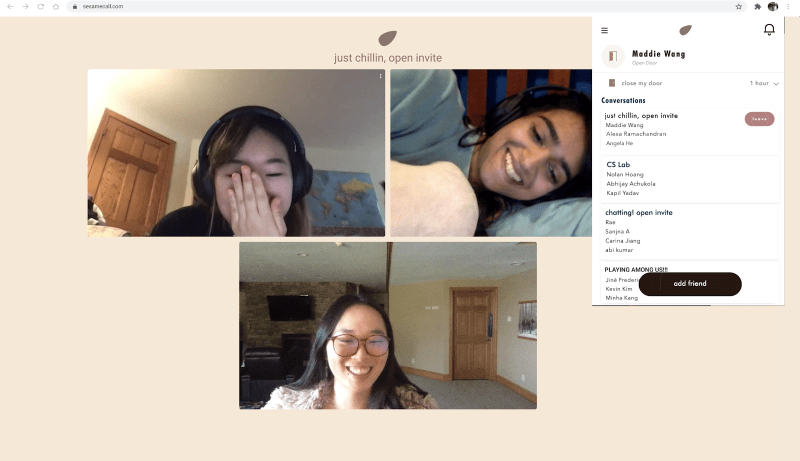Sesame invites students from all years to dive into its concept of revitalizing “co-presence and reconnection” while away from campus. Sesame co-founders Maddie Wang ’21 and Lainey Wang ’23 introduced their digital dorm platform to the Stanford community on Oct. 6, focusing on the three core tenets of casualness, intimacy and spontaneity.
The founding duo first met through Queer Chart, a queer community platform that Maddie Wang co-founded. Now a couple, Maddie and Lainey have worked side-by-side to create Sesame to replace what they called the forced awkwardness of Zoom and Facebook Messenger meetings with improvised hangouts.
After downloading Sesame’s free Chrome extension software, users can set up times with their customizable scheduling calendar, selecting slots when they are free to have friends visit their online dorm and start up a virtual conversational meetup, blocking off times when they are busy.
“A standout feature that Sesame revolves around is our open- and closed- door icon, a simple status system so you know exactly who’s free and who’s not in one glance,” Lainey said.
When the door icon is unlocked, this signifies that the student is available to meet up in a video chat room hosted on the Sesame platform. There, groups of people can collaborate, doing homework in a mutual class, playing online games or simply using the time to catch up and laugh together.

Sesame’s group video feature, operating under the encrypted, open-source server Jitsi, also allows functionalities such as text chatting, screen sharing and sharing meeting links for others to join.
Users can customize the descriptions next to the door availability icons. Students have written “down to talk,” “hop in and chat” and “let’s play Among Us” for times when their door symbol opened, and “busy, don’t disturb” or “I’ll be back in fifteen minutes” when they close up.
“These kinds of quirky statuses next to the names of everyone create an outlet for personal expression,” Lainey added.
According to Maddie and Lainey, over 600 students have joined as of Oct. 8, including nearly 200 Stanford students. Aside from Stanford, the duo has also invited students from Harvard, Cornell, MIT, and the Texas Academy of Mathematics and Sciences (TAMS) to the platform. In seven days, 3,540 calls have been made through the site.
“I expected around 20 to 40 people to come on the first day. But we got around 200, and they started coming and coming,” Maddie Wang said. “It was super exciting to see.”

With a vast array of different outlets for friends to connect or meet new people impromptu, Lainey Wang hopes their startup recreates the experiences back on campus where students would “just bump into each other, in the dorm hallways or at the lunch tables, and just strike up a conversation.”
“Sesame brings that informal vibe to meeting someone randomly and having a spontaneous conversation,” Joseph Ngo ’24 wrote to The Daily. “The other day, I met two random students, and we had tons in common. We talked for about 3 hours straight during our first time meeting. They’re probably the first ‘real’ friends I’ve made at Stanford!”
“The nice thing about Sesame is the accessibility,” Jenna Wang ’21, who watched Maddie Wang and Lainey Wang build the system from the ground up, told The Daily.
Jenna Wang said that when students organize a meeting on a platform such as Zoom, they have to go through a maze of communicating through a separate app, setting up a time and sending a link to finally meet.
“With Sesame, it’s all in one, and on top of that, you lose that need to figure out when people are free because of [Sesame’s] door system,” she said.
“It’s really cool to see how far it has come from a buggy desktop app to now a very convenient and useful Chrome app,” said Alexa Ramachandran ’22, one of the first members of the Sesame community, and who has written a Daily op-ed.
Queer Chart, co-founded by Maddie, faced security concerns regarding user data last year when users’ names, profile pictures, email addresses, dates of birth and other personal information was visible to other users of the platform. The co-founders notified users of the vulnerability and apologized via email.
Maddie and Lainey said they are working on continued additions to the Sesame platform as they dedicate the upcoming months to debug any remaining technical errors. Potential additions include randomized, Roulette-style calls, refined availability notifications and Spotify and Netflix integrations.
The co-founders aim to reach out to as many schools as possible, spreading Sesame beyond students.
“I want to see how Sesame can help tackle loneliness with the rest of the world,” Lainey Wang said.
Contact Tom Quach at tomquach ‘at’ stanford.edu.
